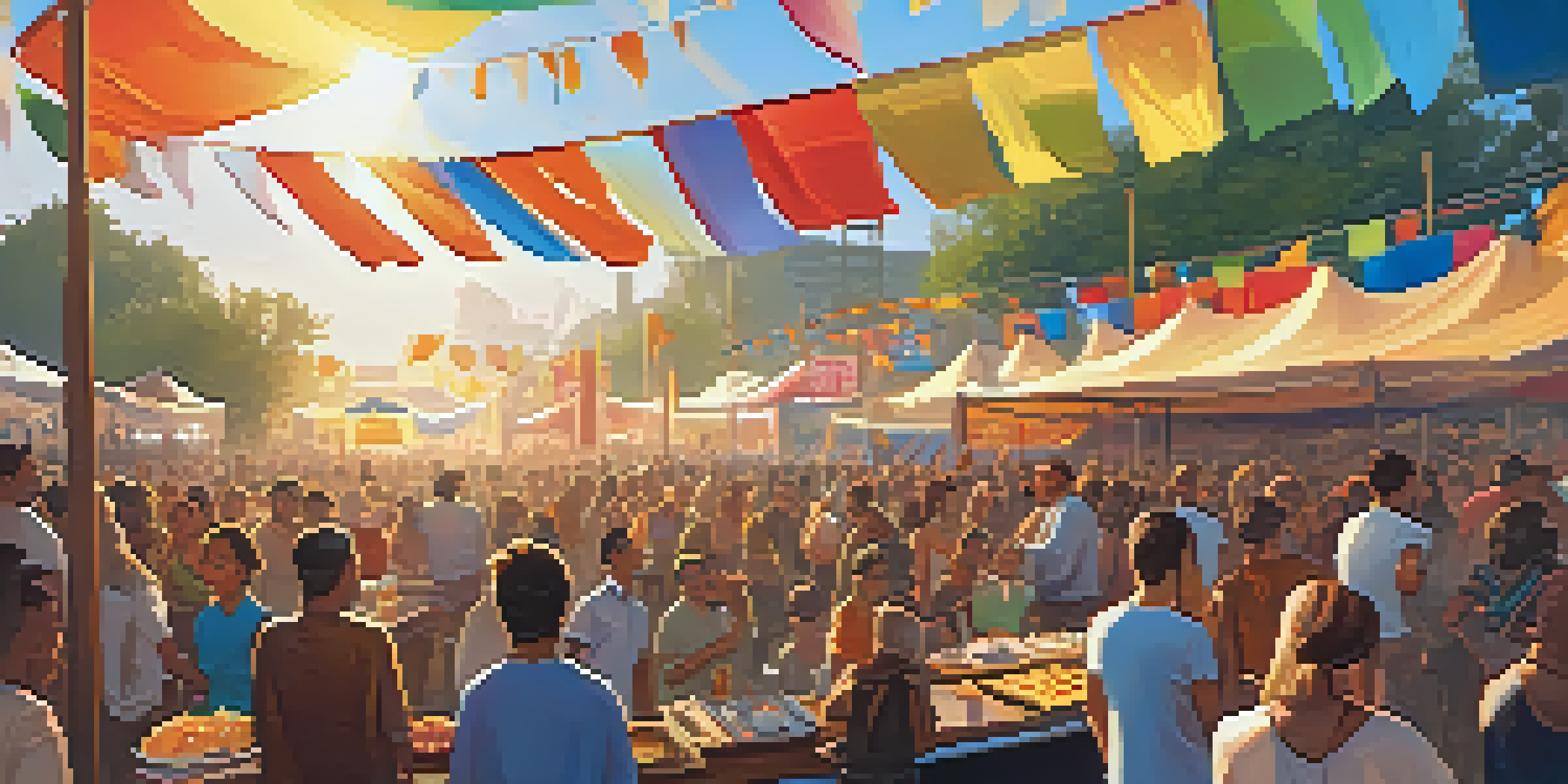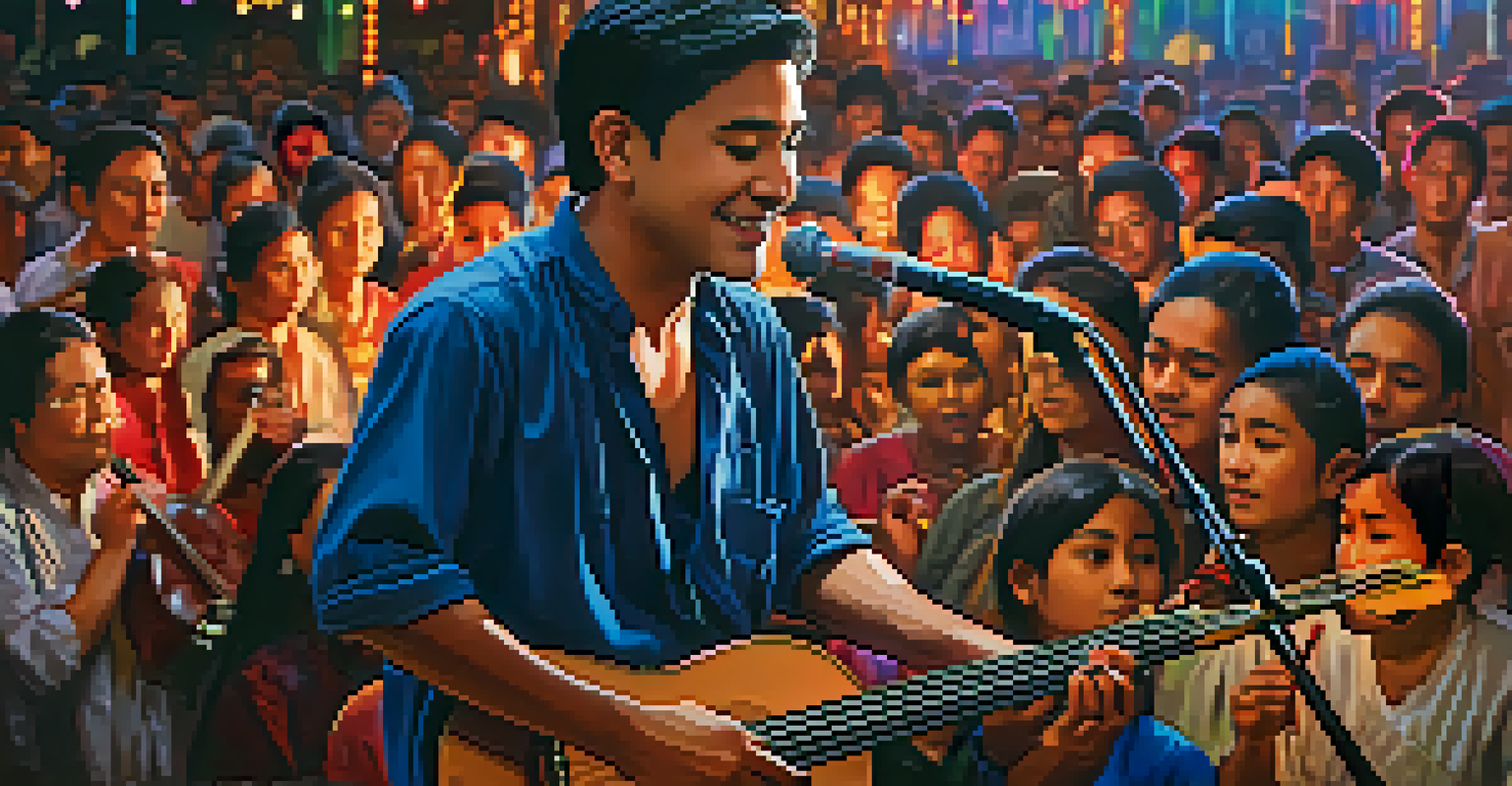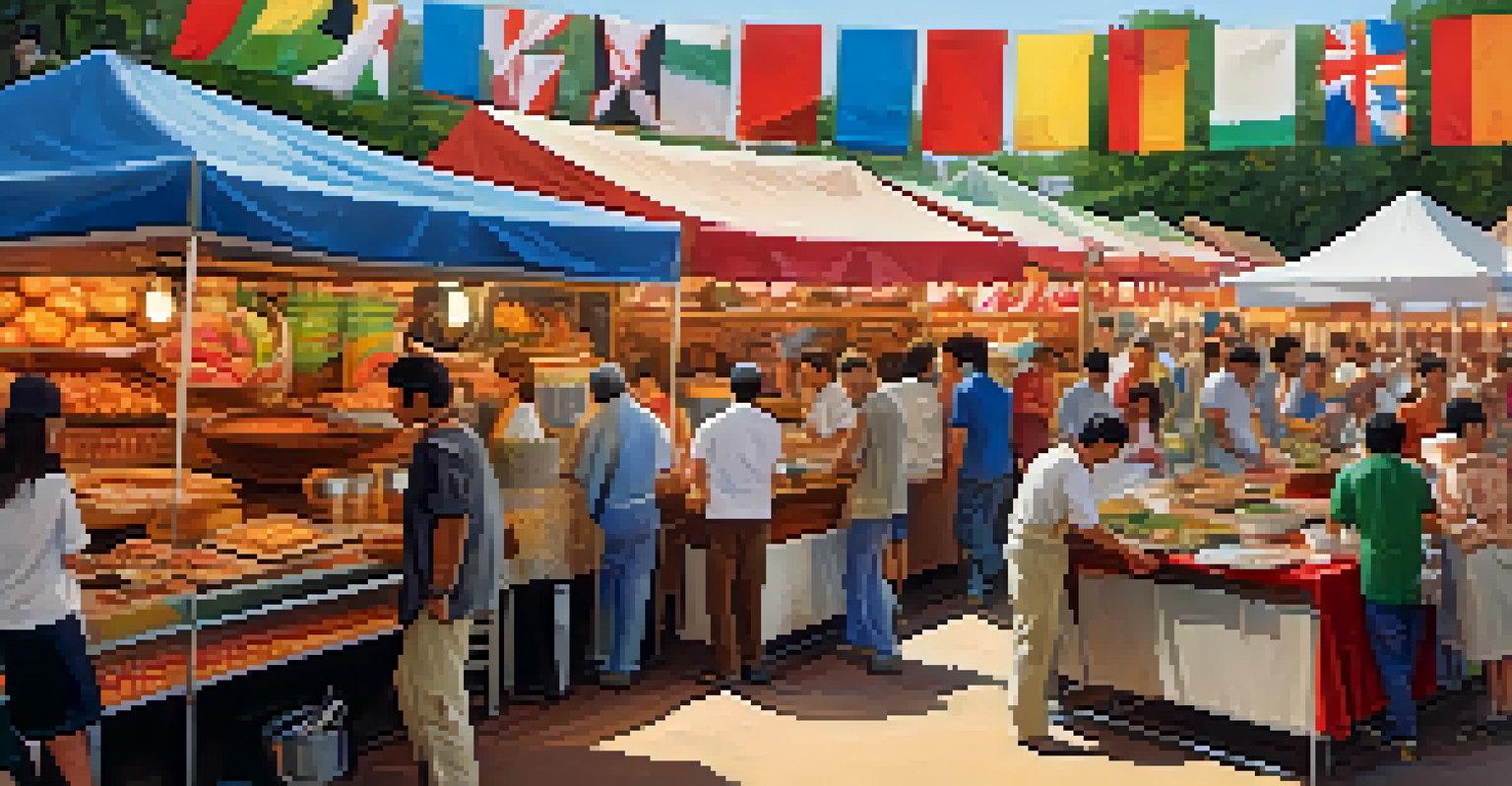Music Festivals: Celebrating Cultural Heritage Through Sound

The Importance of Music Festivals in Cultural Heritage
Music festivals serve as vibrant platforms where cultural heritage comes to life. They offer a unique opportunity for communities to showcase their musical traditions, allowing attendees to experience the rich tapestry of diverse sounds. By celebrating these traditions, festivals play a crucial role in preserving cultural identities and passing them down to future generations.
Music can change the world because it can change people.
For instance, events like the New Orleans Jazz & Heritage Festival highlight local music styles while also emphasizing the historical context behind them. Through live performances, attendees can connect with the culture in ways that textbooks or documentaries often cannot convey. This immersive experience fosters a deeper appreciation for the nuances of different musical genres and their origins.
Moreover, music festivals often create a sense of belonging and unity among attendees. People from various backgrounds come together to celebrate shared interests, bridging cultural divides through the universal language of music. This communal aspect not only enhances the festival experience but also promotes cultural exchange and understanding.
Showcasing Diversity: Global Music Festivals
From Coachella in the United States to Glastonbury in the UK, music festivals around the world celebrate diverse musical styles. Each festival often represents the unique sounds of its region, allowing attendees to immerse themselves in a variety of cultural expressions. For example, the Fuji Rock Festival in Japan blends local artists with international acts, creating a rich cultural exchange.

Additionally, festivals like the Fes Festival of World Sacred Music in Morocco emphasize the spiritual and cultural significance of music in different societies. By featuring artists from various religious and cultural backgrounds, these events foster dialogue and understanding among diverse communities. Such platforms remind us that music is not just entertainment; it’s a reflection of shared histories and values.
Cultural Heritage Through Music
Music festivals serve as vibrant platforms that celebrate and preserve cultural identities by showcasing diverse musical traditions.
These global festivals also serve to educate audiences about the cultural significance behind the music. Workshops, discussions, and interactive experiences often accompany performances, enabling attendees to learn more about the artists and their cultural roots. This educational aspect enhances the festival experience, making it a journey of discovery as much as a celebration.
The Role of Local Artists in Music Festivals
Local artists play a pivotal role in music festivals, representing the heart and soul of their communities. By performing at these events, they bring their unique cultural narratives to a broader audience, showcasing the richness of local traditions. This not only amplifies their voices but also helps to preserve their musical heritage in an ever-evolving cultural landscape.
The music industry is a very difficult place to navigate, and it’s the local artists who keep our culture alive.
Take, for example, the traditional folk music showcased at festivals like the MerleFest in North Carolina, where local talents bring Appalachian music to life. These performances not only entertain but also educate audiences about the historical significance of the music and its roots in the community. It’s a beautiful reminder of how music can tell stories and share experiences.
Moreover, supporting local artists at these festivals fosters economic growth within their communities. As festivals attract larger audiences, local musicians gain exposure, and their craft is recognized and appreciated. This cycle of support helps to ensure that cultural heritage continues to thrive, as new generations of artists are inspired by the traditions of their predecessors.
Culinary Traditions at Music Festivals
Music festivals are not just about the music; they also celebrate culinary traditions that reflect the cultural heritage of the region. Food vendors often showcase local and traditional dishes, allowing festival-goers to indulge in a culinary journey that complements the musical experience. This fusion of food and music creates a multi-sensory celebration of culture.
For instance, the Austin City Limits Music Festival in Texas not only features a diverse lineup of musicians but also highlights local cuisine. Attendees can savor everything from Tex-Mex to barbecue, all while soaking up the sounds of their favorite artists. This integration of culinary experiences enhances the festival atmosphere and fosters a deeper connection to the local culture.
Local Artists Boost Community Growth
Supporting local artists at music festivals amplifies their voices while fostering economic growth and preserving musical heritage.
Additionally, culinary workshops and tastings may be offered, further educating attendees about the origins of various dishes. This interactive experience allows people to learn about the ingredients, cooking methods, and the history behind the foods they enjoy. It emphasizes that culture is not solely expressed through music but is also deeply rooted in food traditions.
Environmental Sustainability at Music Festivals
In recent years, many music festivals have begun to focus on environmental sustainability, recognizing their impact on the planet. By implementing eco-friendly practices, these festivals aim to celebrate cultural heritage while also protecting the environment for future generations. This shift not only enhances the festival experience but also promotes awareness about sustainability.
For example, festivals like Bonnaroo in Tennessee have introduced initiatives such as recycling, composting, and using renewable energy sources. By encouraging attendees to participate in sustainable practices, these events foster a sense of collective responsibility towards the environment. It’s a powerful reminder that our cultural celebrations can coexist harmoniously with nature.
Moreover, sustainability efforts often highlight the connection between culture and the environment. Many music traditions are deeply intertwined with natural elements, and festivals that honor these practices can serve as a platform for advocacy. By promoting sustainable practices, festivals not only celebrate cultural heritage but also ensure that these traditions can continue to thrive in a healthy planet.
The Impact of Technology on Music Festivals
Technology has significantly transformed the landscape of music festivals, enhancing the way we experience cultural heritage through sound. From live streaming performances to interactive apps, technology allows attendees to engage with artists and fellow festival-goers in new and innovative ways. This evolution has expanded the reach of music festivals, connecting diverse audiences across the globe.
For instance, many festivals now offer online platforms where fans can watch performances in real-time from anywhere in the world. This accessibility democratizes the festival experience, allowing those who may not be able to attend in person to still enjoy the music and culture. It also serves as a powerful tool for artists to gain exposure and connect with a wider audience.
Sustainability in Festivals
Many music festivals are adopting eco-friendly practices, promoting environmental sustainability alongside cultural celebrations.
However, this technological shift also raises questions about authenticity and the essence of live music experiences. While virtual participation offers convenience, it’s essential to remember that the heart of music festivals lies in the communal atmosphere and shared experiences. Striking a balance between technological innovation and the traditional festival vibe is crucial to preserving the cultural significance of these events.
The Future of Music Festivals and Cultural Heritage
As we look to the future, music festivals will continue to play a vital role in celebrating cultural heritage through sound. With an increasing emphasis on inclusivity and representation, festivals are likely to feature a broader range of artists and genres. This evolution not only enhances the festival experience but also enriches the cultural dialogue that music fosters.
Moreover, the growing awareness of social and environmental issues will likely shape the way festivals operate. Many organizers are already prioritizing sustainability and community engagement, ensuring that cultural celebrations leave a positive impact. This shift towards responsible festival practices will help preserve cultural heritage while also addressing contemporary challenges.

Ultimately, music festivals are more than just events; they are living expressions of culture and community. As they evolve with the times, they will continue to honor traditions while embracing new influences, creating a dynamic space where cultural heritage thrives. The sound of music will forever echo the stories and histories of the people who create it.